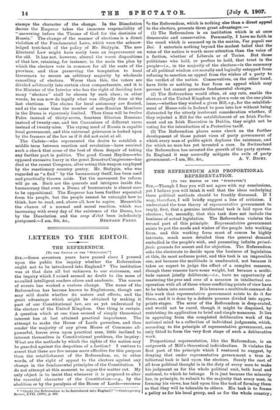LETTERS TO THE EDITOR.
THE REFERENDUM.
rTo THE EDITOR Or THE "SPECTATOR."] SIR,—Some seventeen years have passed since I pressed upon the public the inquiry whether the Referendum ought not to be introduced into England.* The institution was at that date all but unknown to our statesmen, and the inquiry which I raised seemed no doubt to the mass of so-called intelligent readers otiose and academic. The course of events has worked a curious change. The name of the Referendum has become known to Englishmen, though one may still doubt whether its nature and effects, and the great advantage which might be obtained by making it part of our Constitutional law, are as yet understood by the electors of the United Kingdom. One thing is certain. A question which at one time seemed of simply theoretical interest has at last attained practical importance. The attempt to make the House of Lords powerless, and thus render the majority of any given House of Commons all- powerful, forces even upon practical men, little inclined to interest themselves in Constitutional problems, the inquiry : What are the methods by which the rights of the nation may be guarded against the despotism of a faction P I venture to assert that there are few means more effective for this purpose than the establishment of the Referendum, or, in other words, of the right of appeal to the electors against any change in the fundamental principles of the Constitution. I do not attempt at this moment to argue the matter out. My only object is to insist that whenever it is proposed to alter the essential character of the Constitution—e.g., by the abolition or by the paralysis of the House of Lords—recourse • Ought the Referendum to be Introduced into England ?"—Coniemporary Review, LVIL (1890), p. 489. to the Referendum, which is nothing else than a direct appeal to the electors, presents three great advantages :— (1) The Referendum is an institution which is at once democratic and conservative. Personally, I have no faith in the creed which is summed up in the maxim, Vox populi vox Del. I entertain nothing beyond the modest belief that the voice of the nation is worth more attention than the voice of a faction, whether of Liberals or of Tories. But those politicians who hold, or profess to hold, that trust in the people—i.e., in the majority of the electors—is the summary of all political wisdom are morally and logically estopped from refusing to sanction an appeal from the wishes of a party to the verdict of the nation. Conservatives, on the other hand, have little or nothing to fear from an appeal which may prevent but cannot promote fundamental changes. (2) The Referendum would often, at any rate, enable the electors of the United Kingdom to give a vote on the one plain issue,—whether they wished a given Bill, e.g., for the establish- ment of Home-rule in Ireland to pass into law without being distracted by the utterly irrelevant consideration whether, if they rejected a Bill for the establishment of an Irish Parlia- ment and an Irish Executive in Dublin, they might not be voting for the introduction of a Protective tariff.
(3) The Referendum places some check on the further development of those patent vices of party government of which every man of public spirit deplores the existence, and for which no man has yet invented a cure. In Switzerland the Referendum has arrested the growth of the party system. In England it may assuredly mitigate the evils of party














































 Previous page
Previous page